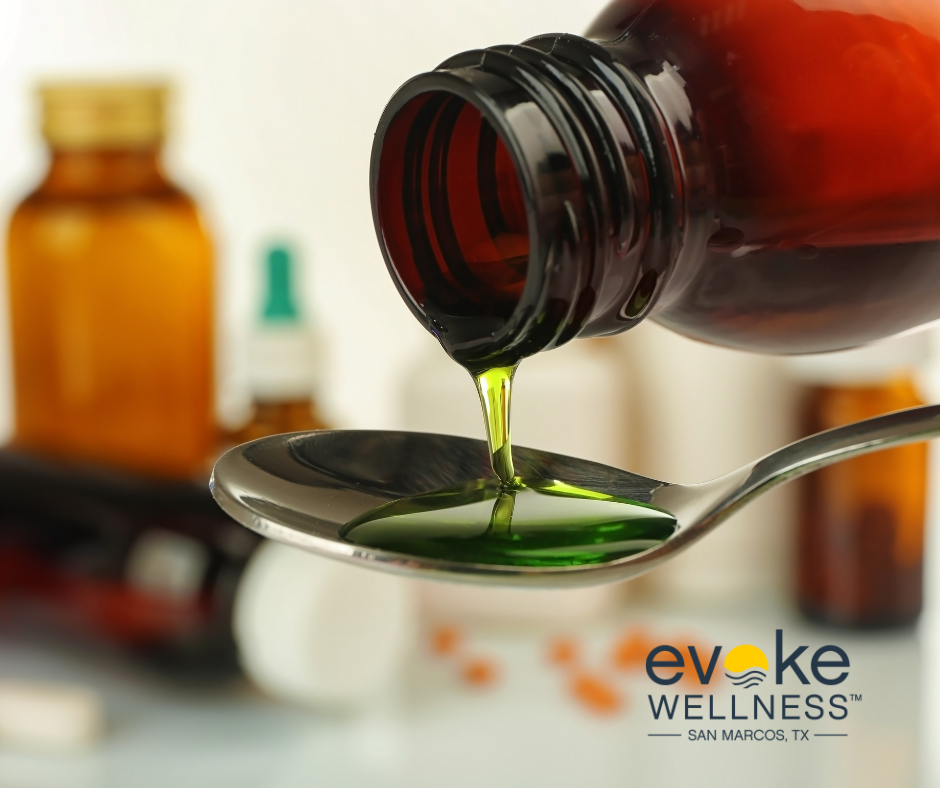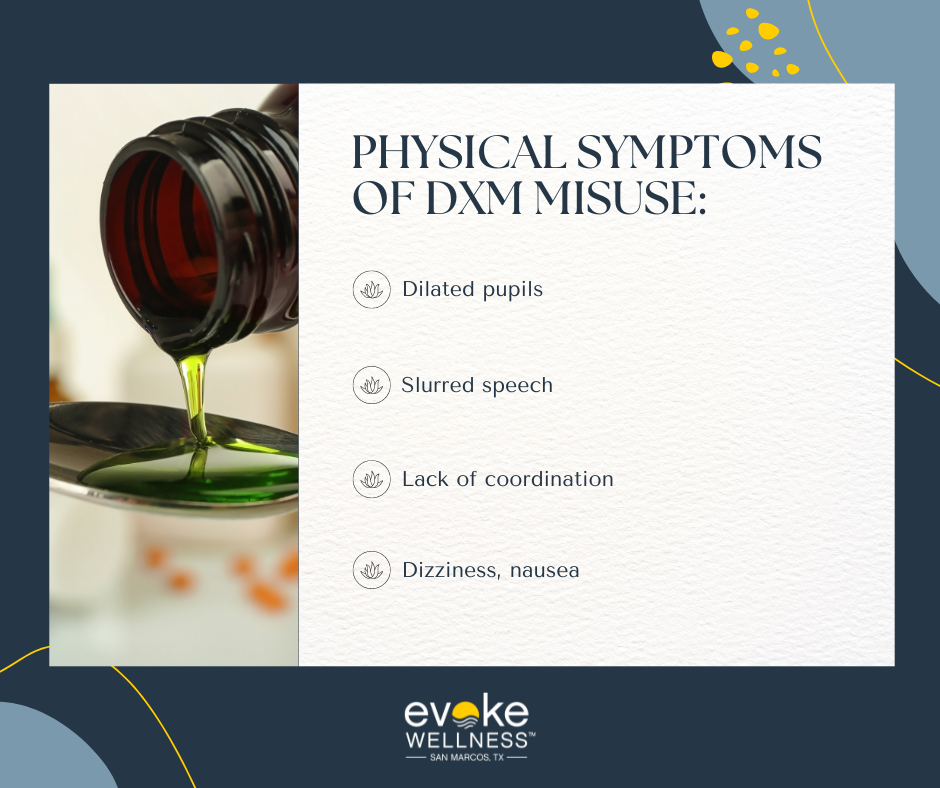You never considered your cough medicine could be so dangerous. Yet dextromethorphan, known as DXM, causes over 5,700 emergency room visits annually when abused. As an over-the-counter cough suppressant, DXM appeals to teens seeking an easy high. Learn the risks and recognize the signs of DXM abuse. Our addiction treatment programs effectively address underlying issues fueling substance misuse. With personalized care, we help you reclaim hope.
Together, let’s embrace the journey to recovery and the promise of a new beginning. Call us at (833) 503-0734 today or reach out online.
What Is Dextromethorphan (DXM)?
Dextromethorphan (DXM) is an active ingredient found in many over-the-counter cough and cold medicines. When taken at recommended doses, it temporarily relieves cough. However, teens and young adults sometimes consume dangerously high doses to get high.
Abuse Statistics
- In 2021, over 3.1% of teens abused over-the-counter cough/cold medication containing DXM.
- DXM is one of the most commonly abused over-the-counter drugs among youth.
Dangerous Effects
At high doses, DXM acts as a dissociative drug, producing:
- Distorted visuals and auditory hallucinations
- Dizziness and loss of motor control
- Increased heart rate and blood pressure
Treatment at Evoke Wellness
Evoke Wellness offers comprehensive substance abuse programs, including:
- Polysubstance abuse treatment
- Men’s and women’s rehab programs
- Medical detox
- Residential treatment
- Veterans program
How Do People Use DXM to ‘Trip’?
Substance Abuse Method
To experience dissociative effects or “trip,” people consume extremely high doses of dextromethorphan (DXM). This over-the-counter cough suppressant is found in many cold medicines. When taken at recommended levels, DXM relieves coughing safely.
However, abusing massive quantities produces mind-altering side effects. Users may ingest 20-100 times the normal dose by drinking entire bottles of cough syrup or consuming extracted DXM powder.
Dangerous Side Effects
At high doses, DXM acts as a dissociative hallucinogen. Side effects can include dizziness, nausea, hot flushes and an “out-of-body” feeling. More extreme reactions like psychosis, seizures and respiratory distress are also possible.
Chronic abuse damages the brain and body. DXM is frequently combined with other drugs in deadly polysubstance abuse.
Word Count: 114
Side Effects and Dangers of DXM Abuse
Dextromethorphan (DXM) abuse can lead to alarming physical and psychological side effects. At high doses, it acts as a dissociative hallucinogen, producing an out-of-body sensation.
Adverse Reactions
- Nausea, vomiting
- Increased heart rate, blood pressure
- Dizziness, loss of coordination
- Confusion, impaired judgment
Psychological Dangers
- Dysphoria, mania
- Paranoia, anxiety
- Visual distortions
- Memory impairment
Overdose Risks
Excessive DXM can cause respiratory depression, seizures, coma and potentially fatal outcomes. Combining with alcohol or other drugs heightens toxicity levels. Long-term abuse may result in psychological dependence.
Seeking comprehensive treatment is crucial for overcoming DXM addiction’s challenges. Evoke Wellness offers tailored programs – from detox and residential care to gender-specific rehab – that provide compassionate support and effective coping strategies.
Recognizing the Signs of DXM Misuse
Psychological Effects
Dissociative “out-of-body” sensations. Distorted visual perceptions. Confusion, memory loss. Impaired judgment.
Behavioral Clues
Social withdrawal. Lying about DXM use. Stealing cough medicines. Dropping grades or performance. Obsessive focus on obtaining DXM.
At high doses, DXM can produce hallucinations, delusions and psychosis. Users may exhibit paranoid, aggressive or violent behavior. Early intervention is crucial to prevent dependency and severe health consequences from DXM abuse.
Preventing DXM Misuse in Youth
Early Education
Educating youth about the risks of dextromethorphan (DXM) abuse is crucial. Schools and community programs should implement age-appropriate curriculums highlighting DXM’s potentially dangerous effects, especially when combined with other substances. Emphasize that even over-the-counter medications can be harmful if misused.
Parental Involvement
Parents play a vital role in preventing DXM misuse among teens. Maintain open communication, monitor online activities, and be aware of warning signs like altered behavior or stealing cough medicines. Secure all medications, including OTC products containing DXM, and dispose of unused medications properly.
Restricted Access
Limiting youth access to DXM-containing products can curb abuse. Retailers should consider moving these items behind the counter or restricting sales to minors. Some states have enacted age verification laws or require products to be sold in secure packaging to deter tampering.
Seeking Help for DXM Addiction
If you or someone you know is struggling with DXM abuse, it’s crucial to seek professional help. Addiction is a complex issue that requires proper treatment and support.
Rehabilitation Programs
Reputable rehabilitation centers offer various programs to address DXM addiction and any co-occurring disorders:
- Detoxification to safely manage withdrawal symptoms.
- Inpatient/residential treatment for a focused, immersive recovery experience.
- Outpatient programs for those unable to take time away from responsibilities.
- Gender-specific tracks tailored to the unique needs of men and women.
- Programs for veterans coping with substance abuse and related mental health challenges.
Finding the Right Facility
When choosing a treatment facility, look for:
- Accreditation and licensing to ensure quality standards.
- Individualized treatment plans addressing your specific needs.
- Evidence-based therapies like cognitive-behavioral therapy (CBT).
- Comprehensive aftercare and relapse prevention planning.
- Family counseling and education to support your recovery journey.
With professional guidance and a strong support system, overcoming DXM addiction is achievable. Prioritize your well-being and take the first step toward a healthier, substance-free life.
Frequently Asked Questions About DXM
What Is DXM?
Dextromethorphan (DXM) is an active ingredient found in many over-the-counter cough and cold medicines. When taken at higher-than-recommended doses, DXM can produce mind-altering effects similar to dissociative drugs like ketamine or PCP.
How Dangerous Is DXM Abuse?
- Overdosing on DXM can lead to vomiting, dizziness, and potentially life-threatening side effects
- Polysubstance abuse involving DXM increases risks dramatically
- Nearly 6% of teens report abusing over-the-counter cough medicines to get high
What Are Signs of DXM Addiction?
Common signs include frequently “losing” medications, stealing household products containing DXM, hosting “robo parties,” failed attempts to quit using, and prioritizing use over responsibilities.
Evoke Wellness at San Marcos offers comprehensive addiction treatment programs, including:
- Polysubstance abuse treatment
- Gender-specific Men’s rehab programs and Women’s rehab programs
- Medical detox
- Residential treatment
- Specialized program for Veterans
Conclusion
As we have seen, the recreational abuse of common cough medicines containing dextromethorphan poses serious health risks, especially for teens and young adults. While many regard DXM as a “legal high,” this cheap and easily obtained substance can quickly lead to dangerous dependencies and side effects. By choosing professional treatment programs tailored to their needs, individuals struggling with DXM or polysubstance abuse can find medical care and counseling support to achieve lasting recovery. With proper treatment, a brighter future awaits.
Begin Your Journey with Evoke Wellness at San Marcos
If you or a loved one is considering treatment, Evoke Wellness at San Marcos invites you to contact us. Our compassionate team is ready to answer your questions, discuss your needs, and help you take the first steps toward recovery. At Evoke Wellness, you will find more than just a treatment program – you’ll discover a community dedicated to your wellness and success. Together, let’s embrace the journey to recovery and the promise of a new beginning. Call us at (833) 503-0734 today or reach out online.



